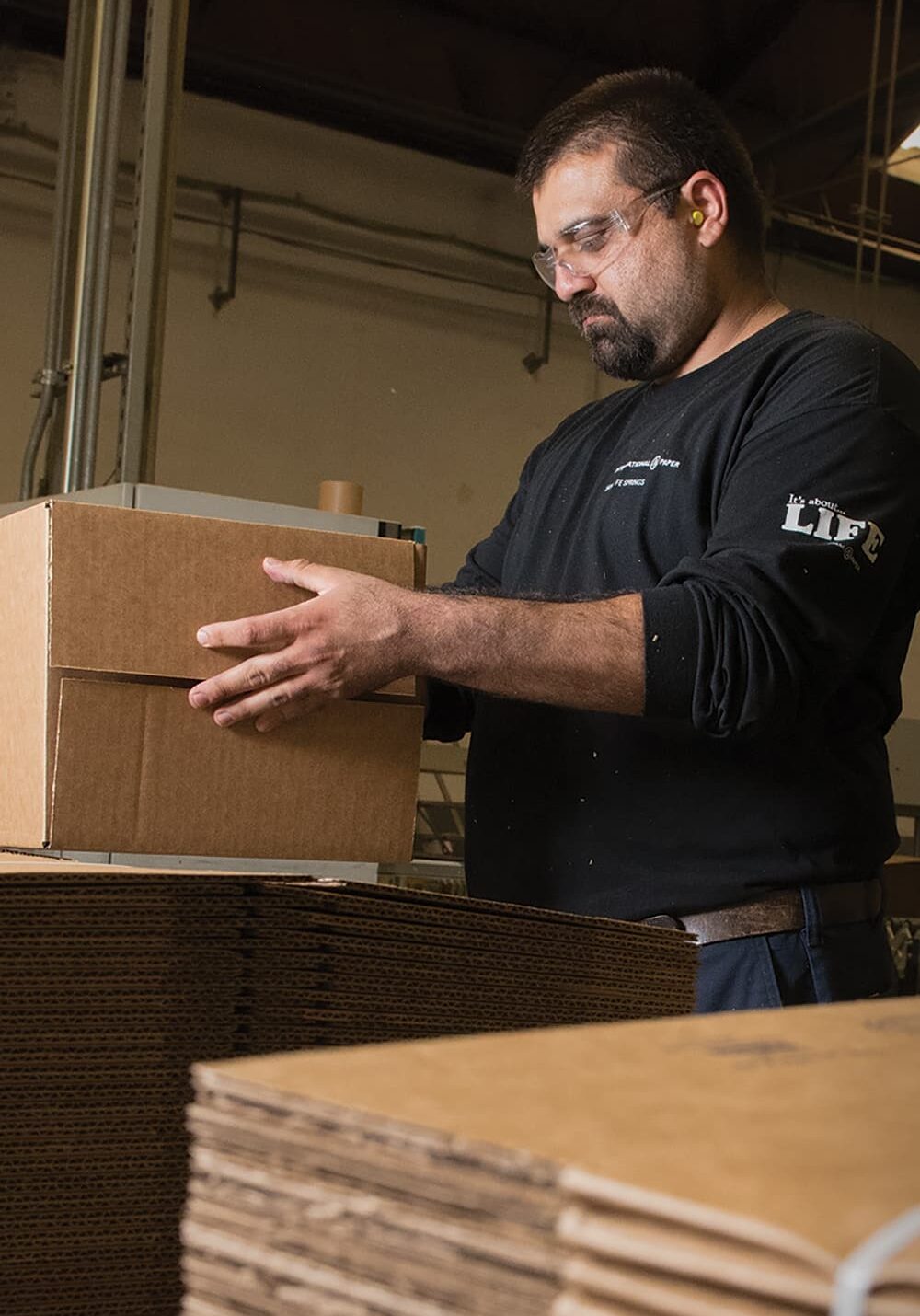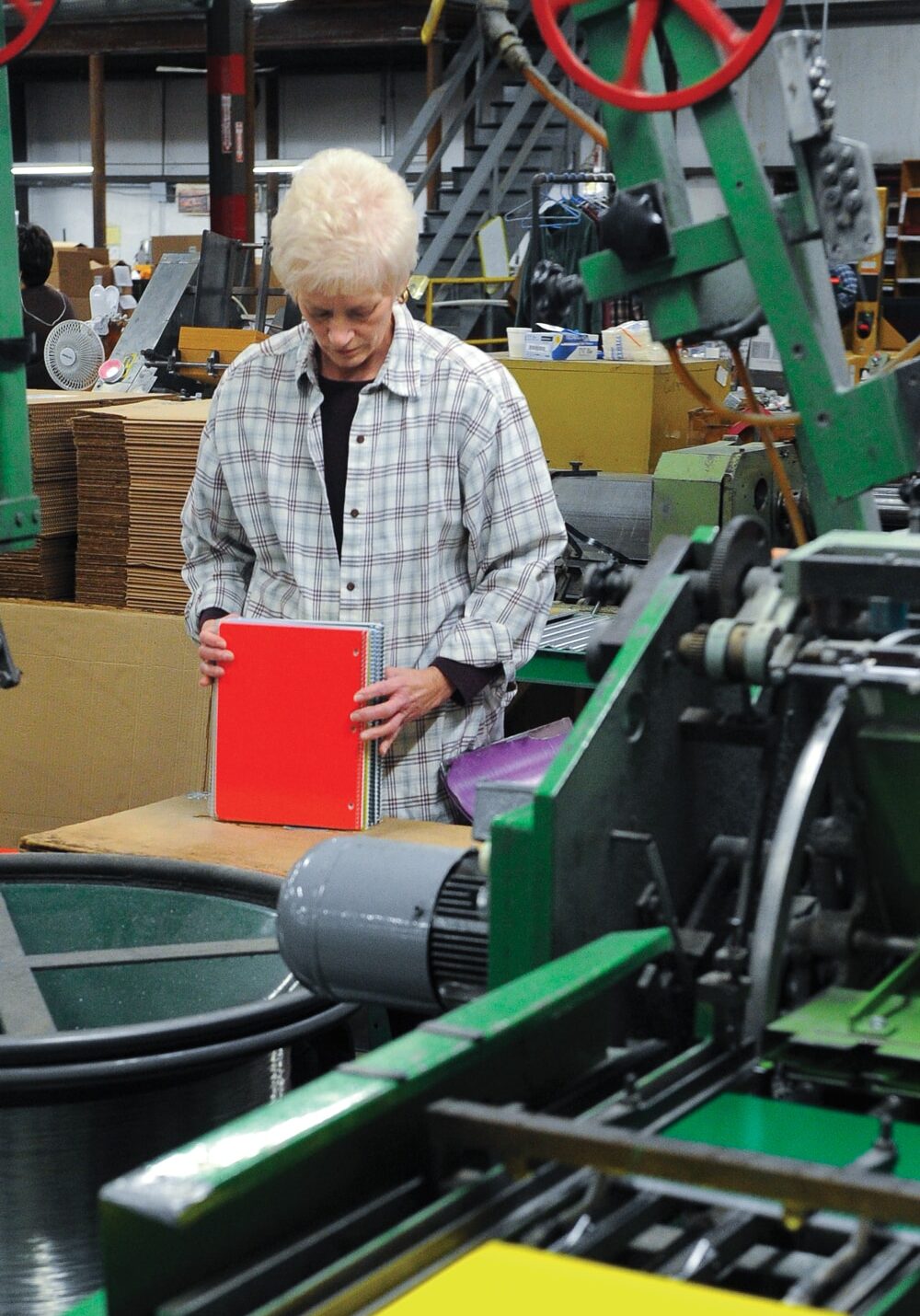In local bargaining for single production sites, USW members achieved general wage increase patterns that surpassed any before.
The USW’s 90,000 paper workers, represented by 550 local unions and 30 bargaining councils, racked up a string of victories over the past three years that set new standards for pay, benefits, safety and work-life balance.
International Vice President Luis Mendoza took over responsibility for the union’s paper sector upon the retirement of Leeann Foster in June 2023, and another veteran negotiator, Breahn Quigley Knackert, took over Mendoza’s previous role as National Paper Industry Bargaining Chair.
In master agreement negotiations with larger councils/employers as well as in local bargaining for single production sites, USW members achieved general wage increase patterns that surpassed any before.
Many agreements also included up-front wage adjustments that recognized cost-of-living challenges and rewarded our members’ dedication over many years.
Just as important, these new contracts delivered more equitable wage structures and achieved meaningful improvements in vacation allotments, both of which aid employers in recruiting and retaining workers.
Other notable wins across the sector included an expansion of paid parental bonding leave as well as stronger successorship language providing workers with additional job security in an evolving industry.
The union is especially proud of gains that underscore members’ commitment to building cultures where all workers have the resources and opportunities to thrive.
Many of the new agreements enable those facing domestic violence situations to take the time off needed to get away from abusers. Moreover, the language calls for training to protect all workers in case an abusive situation spills into the workplace.
The paper sector also continued to expand employer participation in Raising the Bar on Women’s Health and Safety, a USW initiative addressing health and safety needs specific to women. Among other examples, Raising the Bar ensures that facilities provide adequate restrooms for women and personal protective equipment truly designed to fit and protect them.
Hundreds of paperworkers discussed these successes and other issues when they gathered in Houston in August 2024 for the National Paper Bargaining Conference.
It was the first in-person conference since 2018. The theme—“The Power of Paper: We Matter”—emphasized the sector’s importance to both the union and the U.S. economy while highlighting the power that paperworkers wield collectively.
Here are highlights of the key paper contracts negotiated since the last convention:
“Many agreements also included up- front wage adjustments that recognized cost-of-living challenges and rewarded our members’ dedication over many years.”
International Paper
For more than a year leading up to the February 2023 master negotiations with IP mills, paper bargaining staff and local union leaders strategized on how to eliminate the company’s two-tier wage system.
These kinds of systems are blatantly unfair because they pay newer workers less than veteran peers for doing the same work. This inequality also pits workers against each other, undermining the solidarity essential to union power.
To force the issue, the union performed comprehensive studies for all 15 mills in the USW/IP system and found just what negotiators expected—that the tiered system impeded the company’s efforts to attract and retain the workers needed to operate highly sophisticated, world-class facilities in a highly competitive industry.
For the next phase of our campaign, paper bargaining staff traveled to each mill to share the data with local union leadership, local management and IP’s labor relations and human resources personnel. Moreover, negotiators made sure IP heard again and again about the two-tier system’s devastating impact on morale.
In combination with these efforts, the paper sector enlisted the Strategic Campaigns Department to educate members about the bargaining process and keep them up to date. Multiple worker actions across the IP system let management know that members remained unified in support of the bargaining goals.
All of this paid off.
The union eliminated the two-tier system, resulting in instant wage increases of as much as 29 percent for some workers in the second tier. On top of this, members achieved the best-ever general wage increase pattern at IP.
The new master also included improvements in vacation for both new hires and longer tenured workers. It increased sickness and accident and life insurance benefits. And it upgraded pensions and introduced one week of paid parental bonding leave, among other gains.
Additionally, the agreement required the Joint Health and Safety Committee to form subcommittees to develop a domestic violence leave policy, implement the Raising the Bar on Women’s Health and Safety program, and roll out the highly regarded mental health awareness program called “It’s Okay to Not be Okay.”
Then, on the heels of this victory, the USW bargained a new master that delivered multiple gains for members at 59 IP converting facilities.
The agreement, ratified in February 2024, included the best general wage increase pattern ever achieved in a master covering these locations.
It also featured an immediate supplemental wage adjustment recognizing the inflationary environment, plus vacation improvements for both new and veteran workers, upgrades to sickness and accident pay, paid parental bonding leave and IP’s commitment to developing a domestic violence leave policy for converters.


Georgia-Pacific
Newer workers at Georgia-Pacific typically received less pay than longer-tenured colleagues doing the same jobs until they reached the most senior levels in the wage progression.
And as if that weren’t offensive enough, they also had inferior vacation and holiday allotments.
The new master, bargained in late 2022, eliminated this unfair system and won equitable pay and benefits for all.
But the USW went even further and eradicated another injustice, Georgia-Pacific’s practice of paying workers only 50 percent of the wage difference when they temporarily transferred to a higher-paying position. Now, workers moving to a higher-paying job get the full wage however long they’re going to perform that assignment.
The new master also contained the best general wage increases ever negotiated at Georgia-Pacific, along with improvements to retirement security and life insurance and language covering lactation rooms and domestic violence leave.
The new master agreement for Georgia-Pacific’s USW-represented converting facilities took place a few months after the mill bargaining. It resulted in similar gains, except the converters had no two-tier wage system to dismantle.
Smurfit Westrock
Bargaining for a new master agreement for the 5,000 workers at more than 50 WestRock locations across the United States took place under unusual circumstances in November 2023.
Just two months earlier, the company announced its pending acquisition by Smurfit Kappa, a European corrugated packaging company.
At the time, negotiators didn’t know who would be leading the new company, how they would manage the work force or how these factors might affect USW members.
Workers ultimately achieved a master agreement containing an industry-competitive wage structure, along with upgrades to retirement security and sickness and accident pay. The union also won upgrades to the health and safety structure, vacation improvements for long-tenured workers and reductions in the probationary period for new hires.
Equally important, the new agreement eliminated a new-hire step-rate wage policy at the company’s paper mills that paid workers with fewer than three years’ experience up to 10 percent less than other co-workers performing the same jobs.
Although this was not fully a two-tier system, it nonetheless contributed to poor morale and difficulties in attracting and retaining the quality workers needed to secure the long-term viability of these facilities.
Packaging Corporation of America (PCA)
The paper sector bargained separate master agreements for workers at PCA mills and converting facilities in 2022 that featured industry-leading wage patterns, plus an immediate 1 percent across-the-board hike recognizing union members’ efforts during the pandemic.
Members also achieved across-the-board vacation improvements, including a sixth week of vacation at facilities that previously failed to provide it. In addition, the agreements included improvements in sickness and accident benefits, shorter benefit eligibility wait times for new hires, domestic violence leave, language to help address the serious issue of “green on green” training, and enhancements to health and safety structures.
Essity
In addition to a competitive general wage increase pattern, the new master agreement with Essity in 2023 contained an upfront COVID-19 recognition increase for all job classifications.
It also included “top-up” provisions that increased pending, previously bargained wage increases at locations that hadn’t yet progressed through the prior pattern.
To help attract new workers, negotiators successfully bargained immediate benefits eligibility for new hires. The agreement also included improvements to both short- and long-term disability as well as language addressing “green on green” training, domestic violence leave and lactation rooms.
In another win, one especially important in so-called “right-to-work” states, Essity agreed to a minimum of two hours of union-only time during new hire orientation.
